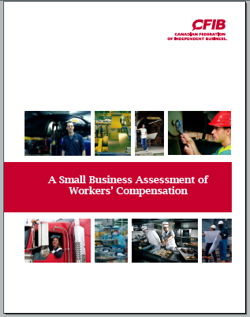 NEWS RELEASE
NEWS RELEASE
CANADIAN FEDERATION OF INDEPENDENT BUSINESS
*************************
Ontario workers’ compensation system in need of complete overhaul; WSIB scores dead last
TORONTO ( December 13, 2011) – New groundbreaking research, A Small Business Assessment of Workers’ Compensation, from the Canadian Federation of Independent Business (CFIB) reveals that overall all workers’ compensation boards in Canada are doing a poor job in meeting the needs of small business.
This comprehensive assessment of workers’ compensation boards, through the lens of small business owners, focuses on all major areas: cost of premiums; claims management; experience rating; classification and assessment; coverage; long-term fiscal sustainability; and customer service.
On a scale of 0 to 10, PEI fares the best with an overall score of 6.9, while Ontario (tied with Quebec) ranks dead last with a score of 4.0.
“Ontario’s small business owners have lost confidence in the Workplace Safety and Insurance Board (WSIB). Other boards across the country have made tough policy decisions to curb expenditures, while WSIB’s blatant mismanagement has sharply increased its debt to $14 billion which threatens the employers who fund the system and the injured workers who rely on it,” said CFIB’s Ontario director, Plamen Petkov.
The WSIB received the lowest scores on long-term financial sustainability, experience rating and customer service.
“Instead of heeding the provincial government’s lead on job creation and economic growth, the WSIB continues to undermine the efforts of the Ontario’s job creators by hiking employer payroll taxes to cover its own financial mess,” added Petkov.
Workplace safety and having a good plan for covering workplace injuries is a priority for everyone so it is critical that boards are well run-this includes keeping paperwork manageable and costs reasonable for employers.
“Businesses are solely responsible for funding workers’ compensation through mandatory employer premiums. Premiums are a tax on payroll that must be remitted, and the high cost of premiums can make it difficult for small firms to increase their employee wages, invest in their business and create jobs. It is crucial that boards take action based on findings in this report,” said Doug Bruce, CFIB’s vice-president, research.
This is the first time workers’ compensation boards have been subject to this kind of scrutiny and comparison.
“Quite frankly, the results are unacceptable and the boards have much work to do to meet the needs of their small business clients,” concluded Bruce.
To view the full report visit here.
*************************